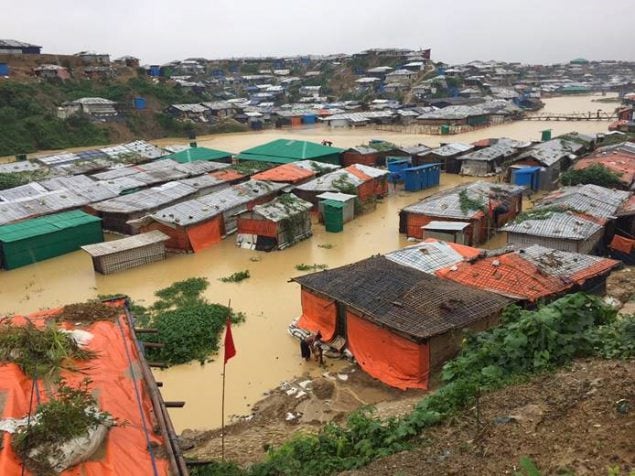CDC: Preventing waterborne outbreaks in refugee camps
December 16th, 2019Hundreds of thousands of ethnic Rohingyas crossed the border into Cox’s Bazar, Bangladesh to escape violence in Rakhine State in Myanmar. More than 900,000 forcibly displaced Myanmar nationals live in refugee camps in Bangladesh. Because conditions are crowded and the area is prone to flooding, the risk of Acute Watery Diarrhea (AWD) and other waterborne disease outbreaks had to be reduced during the 2018 monsoon season. Humanitarian partners distributed household water treatment products throughout the camps and combined this with messages to promote good hygiene. However, a recent water, sanitation and hygiene (WASH) survey estimated that only 13% of households treat household water. Of the 182 households that reported to treat water using chlorine tablets, only 53 (21%) had detectable chlorine in their stored water, an indicator of whether water was treated and was protected from recontamination during storage in households. Bucket chlorination, where an attendant sitting by the well directly chlorinates each bucket of water as it is collected was also implemented, but only at a small number of wells. Because of low levels of household water treatment in the camps, the water, sanitation, and hygiene (WASH) team recommended to scale-up bucket chlorination to ensure households were using chlorinated water during the monsoon season.

The WASH team within CDC’s Emergency Response and Recovery Branch (ERRB) worked with UNICEF and non-governmental partners to increase bucket chlorination from June to September 2018. In July, ERRB WASH specialists measured chlorine levels in one camp to provide a snapshot of current levels of chlorine in the water. After this, the WASH team started a program to monitor bucket chlorination, using mobile phone surveys to ensure chlorinators were present and that chlorine was in water in nearby households. In addition, they piloted guidelines to help identify which drinking water wells should receive bucket chlorination first. Finally, the WASH team provided guidance to implementing partners on how to scale-up and improve bucket chlorination based on assessment and monitoring results.
In addition, CDC supported the WASH Sector in Cox’s Bazar and UNICEF by training local staff on how to conduct water quality testing and drafting guidance on water quality monitoring, including a system to monitor E. coli levels in wells through the dry and monsoon seasons.
The Rohingya face extremely challenging circumstances as they seek refuge in makeshift camps. The 2019 UN World Water Day theme is “leaving no one behind” and CDC seeks to assist partners in providing safe, treated drinking water to the world’s most vulnerable communities.

